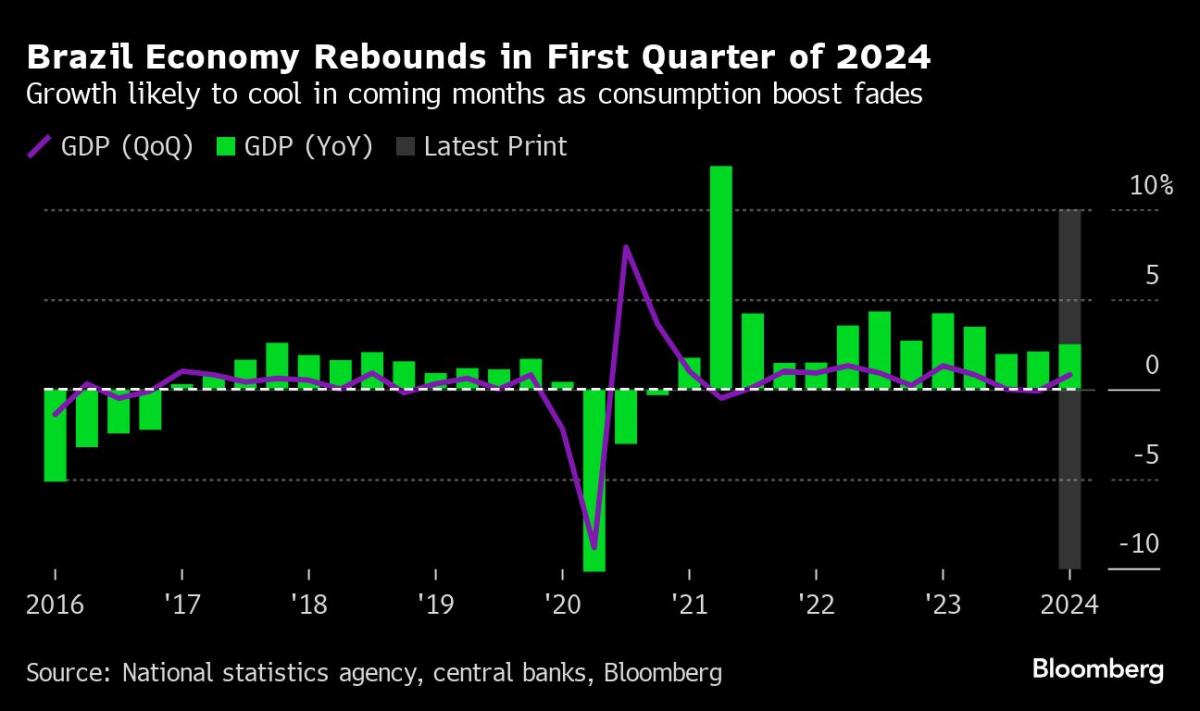(Bloomberg) — Brazil’s economy started the year again with a bang, exceeding expectations and giving President Luiz Inacio Lula da Silva reason to celebrate. This time the victory will likely be much less sustainable.
Most read from Bloomberg
After six months of stagnation, gross domestic product grew by 0.8% in the first quarter compared to the end of 2023, the national statistics agency said on Tuesday. Investments, agriculture, household consumption and services posted solid gains.
Yet the pace of growth was less a result of the underlying strength of the economy than of government transfers, which temporarily increase the purchasing power of consumers. Now the central bank is seen to be on the verge of halting interest rate cuts, and the government is hampered by limited spending space. All in all, the coming months look less rosy for Lula as he is already dealing with frustration over food prices and his response to devastating floods.
“We will lose momentum faster than last year,” said Rafaela Vitoria, chief economist at Banco Inter SA in Belo Horizonte.
Lula celebrated Tuesday’s figures as evidence that household demand was once again powering Latin America’s largest economy, a return to the consumption-driven boom of his previous years in office.
Household consumption, one of the main drivers of the period, rose 1.5% compared to the previous three months, and investments rose 4.1%, the statistics agency said. The services sector grew by 1.4% as consumers lost their extra income.
“This is further proof that we are moving in the right direction,” the president wrote on X after the publication.
‘Very concerned’
Many economists warn that the first quarter growth was likely a one-off and not the start of a robust recovery, given double-digit borrowing cost pressures.
What Bloomberg Economics says
“The increase in household consumption and investment drove strong GDP growth in the first quarter in Brazil, with a healthier composition than in recent quarters. Relatively tighter financial conditions and the impact of massive flooding in the southern part of the country are likely to dampen growth from the second quarter onwards and add a slight downward impact to our 2% growth forecast in 2024.”
– Adriana Dupita, economist from Brazil and Argentina
— Click here for the full report
The activity was also fueled by billions of dollars the federal government injected into the economy by paying backlogged claims, known as “precatorios,” in lawsuits it had lost. As of late last year, the government became mired in debt worth 94 billion reais ($17.9 billion), or roughly the equivalent of about 0.8% of GDP, according to Goldman Sachs Group Inc.
Brazilians also benefited from a 7% minimum wage increase that came into effect in January and social security benefits. Economists say the transfers will have a more limited ripple effect than last year’s agricultural boom.
While growth is likely to moderate, it is unlikely to reach pre-pandemic sluggish levels – especially with midterm elections later this year, said Alberto Ramos, chief economist for Latin America at Goldman Sachs.
“President Lula is very concerned about the growth and his popularity.” Ramos said. We expect him to “grease the wheels of growth going forward,” he said.
Squeezed voters
Lula managed a healthy economic expansion last year without budget explosions, largely thanks to what has been called the ‘super harvest’. Record-breaking crops like soy and corn helped the resource-rich country surpass analysts’ more pessimistic forecasts in early 2023.
Agriculture rose 11.3% in the first quarter of 2024, well below last year’s highs. The industry fell 0.1%, a trend that analysts expect to continue as high financing costs hurt production.
Voters also feel pinched. Recent polls show Lula’s approval rating has fallen to around 50%, the lowest of his term, as Brazilians express concerns about crime and more expensive food.
At the same time, he has suffered a series of defeats in Congress over his legislative initiatives.
While overall inflation cooled over the period, tight monetary policy is not expected to ease price growth much further. Meanwhile, damage from flooding in Rio Grande do Sul state, an agricultural powerhouse that represents about 7% of Brazil’s economy, continues to be tallied as waters there gradually recede.
The situation has led investors to worry that the government will move further away from Finance Minister Fernando Haddad’s promises to strengthen public accounts.
“The risk is real,” said Thiago de Aragao, head of strategy at consultancy Arko Advice. “The only way he can regain his popularity, regain power in Congress and become a more influential president is through spending.”
–With help from Giovanna Serafim, Robert Jameson and Bruna Lessa.
(Rewrites the story, adding comments from economists and political analysts, starting in the fourth paragraph)
Most read from Bloomberg Businessweek
©2024 BloombergLP






